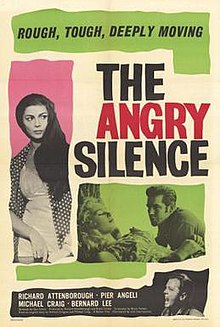The Angry Silence
| The Angry Silence | |
|---|---|
 | |
| Directed by | Guy Green |
| Produced by | Richard Attenborough Bryan Forbes Jack Rix |
| Starring | Richard Attenborough Pier Angeli Michael Craig Bernard Lee |
| Cinematography | Arthur Ibbetson |
| Edited by | Anthony Harvey |
| Music by | Malcolm Arnold |
| Distributed by | British Lion Film Corporation |
Release date | 15 March 1960 |
Running time | 95 minutes |
| Country | United Kingdom |
| Language | English |
| Budget | £97,000[1][2] |
The Angry Silence is a 1960 black-and-white British drama film directed by Guy Green and starring Richard Attenborough, Pier Angeli, Michael Craig and Bernard Lee. The film marked the first release through screenwriter Bryan Forbes's production venture, Beaver Films, and Forbes won a BAFTA Award and an Oscar nomination for his contribution (shared with original story writers Michael Craig and Richard Gregson).[3]
Plot
Factory worker Tom Curtis (Richard Attenborough) has two children and his wife, Anna (Pier Angeli), is pregnant, putting him under financial pressure. Consequently, he refuses to take part in an unofficial strike, meaning a loss of wages, which he is entitled to do. The strike is planned by outside activist Travers (Alfred Burke) and orchestrated by shop steward Bert Connolly (Bernard Lee), who concocts spurious demands as part of his campaign to pressure the management into agreeing to a closed shop, giving the union greater influence.
Those who continue to work find that their properties are subject to repeated attacks, including bricks through windows and arson, and join the strike out of fear. Curtis alone continues to work in a show of defiance against threats and intimidation.
When the strike ends, Curtis is accused of being a scab and sent to Coventry.[4] Then, when anti-union newspapers interview him and report on his plight, Connolly demands his dismissal, backing his demand with a work to rule and overtime ban. Management fears that continued publicity will mean the loss of a major contract, while some workers take matters into their own hands.
Cast
- Richard Attenborough as Tom Curtis
- Pier Angeli as Anna Curtis
- Michael Craig as Joe Wallace
- Bernard Lee as Bert Connolly
- Alfred Burke as Travers
- Geoffrey Keen as Davis
- Stephen Lindo as Brian
- Laurence Naismith as Martindale
- Russell Napier as Thompson
- Penelope Horner as Pat
- Brian Bedford as Eddie
- Brian Murray as Gladys
- Norman Bird as Roberts
- Beckett Bould as Arkwright
- Oliver Reed as Mick
- Edna Petrie as Harpy
- Lloyd Pearson as Howarth
- Norman Shelley as Seagrave
- Daniel Farson as Himself
- Alan Whicker as Himself
- Ronald Hines as Ball
- Bernard Horsfall as Pryce-Evans
- Roger Maxwell as Collins
- George Murcell as Jones
- Gerald Sim as Masters
- Marianne Stone as Mavis
- Frederick Peisley as Lewis
The film is also notable for the early appearance of several actors who later went on to become household names, such as Oliver Reed.
Production
Kenneth More was initially considered for the role of Tom Curtis.[5]
Reception
The film received positive reviews in the UK and US. Variety wrote that Guy Green had directed with 'quiet skill, leaving the film to speak for itself'. The film was entered into the 10th Berlin International Film Festival.
By 1971 the film made an estimated profit of £58,000.[1] In 1997 Bryan Forbes estimated the profit at £200,000.[2]
After the film's release Richard Attenborough visited a working men's club in Aberdare, South Wales, that was refusing to show the film. Many such clubs had banned the film because of its anti-strike plot. However, after Attenborough explained his position on the film, the miners allowed it to be screened. This was important because, during the 1960s, films required such showings to drive ticket sales.[3]
Some critics have raised doubts about the politics of the film, particularly with regard to trivialisation of the needs and demands of the workers.[6] Others suggest that the film is also a reflection of British working-class values at the time, such as 'an Englishman's home is his castle'.[7]
The aggregator site Rotten Tomatoes gives the film an audience approval rating of 78%, based on 143 ratings.[8]
References
- ^ a b Alexander Walker, Hollywood, England, Stein and Day, 1974 pp 98-101
- ^ a b Brian McFarlane, An Autobiography of British Cinema, Metheun 1997 p193
- ^ a b "The Angry Silence: the film they tried to ban". The Daily Telegraph. Retrieved 21 November 2015.
- ^ "The Angry Silence (1960)". BFI. Retrieved 21 November 2015.
- ^ Brian McFarlane, An Autobiography of British Cinema, Metheun 1997 p36
- ^ Angry Silence, The (1960) at BFI Screenonline
- ^ Crowther, Bosley. 'Movie Review: The Angry Silence (1960)'. New York Times, 13 December 1960
- ^ "The Angry Silence (1960)" on Rotten Tomatoes
External links
- The Angry Silence at the TCM Movie Database
- The Angry Silence at IMDb
- The Angry Silence at AllMovie
- The Angry Silence at the BFI's Screenonline
- The Angry Silence at BritMovie (archived)
- Movie Location
